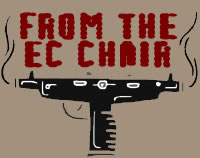
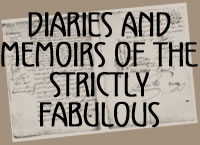
GiO
outfits a life with wings in a sweeping epic of self &
stories
Xaviera
Hollander Recalls the Ecuadorian Blowjob of 2003 and
Clyde's Reaction in these sizzling pages torn alive from her
secret diary
Calliope
Nicholas had (and has) an interesting life, filled with
fascinating people; she looks with bemused but unsparing kindness
on the passing parade and self-spectacle 
THE
ORACULAR REVIEWER
In which ONE HUNDRED new books answer questions posed
by the Corpse:
ANOTHER
SOUTH: EXPERIMENTAL WRITING IN THE SOUTH, edited by Bill Lavender;
University of Alabama Press, 2003
Q:
Will the other southerners dig this stuff?
A:
"Who is worthy to open the book?
Bed of the dragon's rage
where lamentation was written"
(from The Bicameralization by Ralph Adamo).
IN
THE HUB OF THE FIERY FORCE: COLLECTED POEMS, 1934-2003,by
Harold Norse; Thunder's Mouth Press, 2003
Q:
What wisdom can we derive from this astonishing life of
poetic practice?
A:
"Stretched near Scotch purse we lay
talking until the motors died.
You turned and swore in the grass,
cursing the grandees who killed for gold at the mission trading
posts.
You wanted to slay history's ghosts.
On a eucalyptus branch
a pelican sat. A porpoise nosed
the wave. We watched
hibiscus braid the coral wall,
mingling blood-red with bone-white.
Something you said made me keep still:
"Bitter is love words have to prove."
A Plane swooped down, a bayonet
aimed at our hearts. My nerves jammed.
Across the inlet palms shook.
Hunkered down on my haunches
I fondled a cross-barred Venus.
Body language said it all.
(The Bay, Key West, 1942)
SELECTED
POEMS 1950-2000, by Nathaniel Tarn; Wesleyan University Press,
2002
Q:
What is the anthropology of now?
A:
"And I am become a land of ghosts
as a tree full of bird song but no birds
where the mist clings to branches like cotton and the wind
drawls mourning
From the other side, it was as if we had been calling
for this, as if the weight of our need were such that it had
magnetized the seas, and called a great pole to ourselves
up from the place where the sun sets, and which we had named:
the western gate, and had placed all our dreams there, in
who knows what hands..." (from La Traviata (11):
The Last Illusion, 1975).
MIXED
PLATE, NEW & SELECTED POEMS, by Faye Kicknosway; Wesleyan
University Press, 2003
Q:
How deep do the tangled roots of paradise reach?
A:
" Christopher Columbus was a thief,
then he was a beggar.
Florida was a postcard to him.
That's as close as he got.
Jonah climbed in his window.
It was the size of a spoon.
He had a sailor's face,
ll weeds and sticks that wouldn't burn.
He asked Columbus to take it off of him.
But Columbus was made of ashes.
Thistles of light fell
and priests, like fat toys
from coloring books, came to Columbus
to ask him why.
He said it was because their map
had no exit.
But neither did his.
Green flies flooded his heart.
He put it in a biscuit tin
under his bed.
Geometry ate it, spitting in it first."
(Short Take 20)
THE
MIDNIGHT, by Susan Howe; New Directions, 2003
Q:
How often must the experiment be repeated?
A:
"Often you must turn Uncle John's books around and
upside down to read the clippings and other insertions pasted
and carefully folded inside."
ONE
BIRD ONE STONE, 108 AMERICAN ZEN STORIES, by Sean Murphy;
Renaissance Books, 2002. (with some drawings by Keith Abbott).
Q:
What is the sound of one turtle snapping?
A:
"All right,' I accost Bob,who points his kitchen
knife menacingly at me. ‘"I'll gladly bring you
the temple treasures. But first, if you're such a master thief,
show me how to catch one of the koi in these pond without
getting your hands wet!'"
TRIP
TO BORDEAUX, by Ludwig Harig, 1965, translated from German
by Susan Benofsky; Burning Deck, 2003, No. 6 in the Dichten
series edited by Rosmarie Waldrop.
Q:
Will we have flashbacks?
A:
"As we have showed you before, once matters had begun
in the accustomed manner, the company clearly and at once
saw that our preparing to rouse ourselves was wasted effort,
for commonly when we had set our minds to rousing ourselves
in the accustomed manner, what ensued thereon was the near
immediate conclusion of the said rousing, notwithstanding
whatever effort we might give ourselves. An attempt beforehand
at rousing ourselves had already resulted in the said rousing's
near immediate end, as commonly ensues in the accustomed manner
following the attempt at rousing." (from The Hurly Burly)
click to continue...
Jonny
Diamond in "The Man Who Threw Poetry at a Raccoon
in the Ceiling" answers two questions with one toss:
what to do about raccoons (intelligent, fearless, attic-dwelling
animals with great family values), and how to manage that
feeling of metaphysical impotence raised by the reading of
Rilke.
Melissa
Weinstein protests the ubiquity of the reader and
the surfeit of poets, using inside info, and an extremely
surprising technique straight out of Cesanne
Anna
Beskin is leaving New York and is sad. The Corpse
know how she feels and likes her poetry
Aaron
Petrovich has his person say "I am a stutter
in the discourse of infinity," a definition arrived at
from careful golemic construction using nouns and pronouns
Eric
Torgersen manages an entire poet life en pointe (of
line) and makes looking back a dubious pleasure
Bill
Lavender works at the Poetry Art store and projects
his thoughts into shapes that were once called "concrete
poetry," but which have lightened up considerably since,
and are now made of balsam and shed snakeskin
S.
Beth Bishop tracks an "interloper in suburbia"
and "the apparent patience of revolution" with poetry
Marthe
Reed is in her poetick works "a flower calculus."
Just look.
Liviu
Georgescu produces what we initiates call "the
Georgescu monad."
David
Rachels pens an "Adulterous ABC: an Alphabet
Primer for Adults," demonstrating to this musical ear
that all scat is sex
John-Ivan
Palmer, a Corpse reporter since the late 1980s, travels
once again on behalf of our monopoly to bring us, this time,
a throbbing inside account of the poetry underground today,
a seemingly inexhaustible topic; recently we even saw a film
on the Sundance Channel about the Australian Lesbian Poetry
Underground. This thing has legs!
Daniel
Y. Harris in "The Latecomer" redistributes
poetick kulchur through hyper-reality gently, like a rain
of unpaid bills, and discovers, in the end how to "breathe."
Kit
Wienert brings up Rilke too, but instead of bashing
raccoons with Rainer, he enlists him in an aphoristic army
of advice to poets; from that fearsome line-up, we note the
word "spank."
Miranda
Joan Howe in "Mohammad X Goes Mex" raps
something fierce; we believe –here at Corpse quarters—that
Poetick Kulchur should not flee from every slam; stay for
this one.
Christopher
Robbins, Miranda's standup-poetry brother, asks the
perfectly reasonable question, "Who among us will remain
in glory after last night's reading?" which reminds the
editor of the frightening vision contained in this line by
Pat Nolan: "The chairs are on the table." Sooner
or later.
Christian
Prozak reminds the sophisticated roues of the Corpse
that their rebel ancestors, Edward Sanders, J. Kerouac, LF
Celine, and Mike Topp, can and will light flames of hellish
truth and lyric liberation in every heart, still. (When did
Mike Topp turn into an ancestor?)
Jonathan
Kiefer reports from San Francisco's "Jack Miceline
Place."
Peter
Jay Shippy, terse, aphoristic, noh-like.
Dana
Wilde notes, eruditely and at length, that Zen is
here right now, equally at home in Miranda and in Prozak;
he accomplishes this by carefully reading "Horse Medicine"
by M.C. Dalley, Zen Rake.
Cye
Johan SPECIAL! This is a book-length tour-de-force
essay on Tom Bradley and "The Sam Edwine Pentateuch."
This may be the longest piece ever published in the Cybercorpse,
and the first appearance of a genre so strange we are turning
away from naming it (and you know us, we'll name a tricolor
bird newspaper hat "Kit," if you let us). Advice:
read emphatically.
Raymond
Queneau co-signed our Exquisite Corpse lines; here,
the cher maitre is englished by Daniela Hurezanu and Stephen
Kessler
John
Olson pays homage to Allen Ginsberg

THE Surre(gion)alist Manifesto & Other Writings
by Max Cafard
Price: $10.00 + $2.00 s/h

Sergey
Gandlevski translates America "aimlessly into
the depths of Moscow," for his Russian self in "America
of the Mind," translated by Philip Metres
Denisa
Comanescu notes the explosion of translation and translation
studies in the past two decades, and the central place that
translation has had in the poetry of some poets who were also
translators. What she doesn't say in her short essay is something
we would like to challenge our contributors to think and write
about, namely that modern and postmodern literature, particularly
poetry, has been nothing but a meditation on translation (or
not). This will be a theme for the next issue of the Corpse,
so consider this a call to arms. (fr. Latin, armas, fr. TV,
Armani)
Radu
Doru Cosmin is a Romanian poet who writes in English,
the lingua franca of Eastern Europeans raised on MTV and the
Cartoon Network. There is an obvious New York School of poetry
influence in his liberal use of his friends' names, proving
once more the astonishing community-building warmth of that
Pop-era phenomenon
Emmy
Grant is the untranslated brainchild of Milajurko
Vukadinovic who writes in six languages, including Romanian.
Emmy's poems confront in Romanian questions having to do with
immigration to America and the English language.
Haim
Haskal writes with undiluted astonishment about the
Bucharest of his youth where he has returned after 35 years.
He's sincerely nauseated by the return of fascism and makes
a good case for why Cosmin writes in English.
Attila
Jozsef, Hungary's wonderful modern poet, is rendered
into English again by Gabor G. Gyukics and Michael Castro.
The Corpse is a great admirer of John Batki's translations
of Joszef (we published some a few years ago), but we recognize
the necessity of retranslating the great poets every decade.
Each new translation reinfuses the poetry with living juice
and provides us with a perfect mirror of our own zeitgeist.
Jeanine
Shackleton practices the variety of translation we
sometimes call "bureau reports," that is, she translates
borders and Japan (for instance) into American verse.
Stoyan
Valev's
stories are translated from the Bulgarian by Mariana Zagorska
and Nevena Pascaleva, and we are offering them here only partly
for their inestimable worth; the other part is nostalgia for
a certain kind of humanist (nee socialist) realist style that
had its heart-quickening charms for the editor
John
Verlenden continues here, in "Road to Damascus,
Part III," the long and wondrous journey he has had the
readers of the Corpse traveling since the mid-90s. If I was
a New York publisher I would look back on John Verlenden's
reports from Egypt and elsewhere in the Middle East, and rush
into print an elegant illustrated volume. Timely book, great
sales guaranteed. Yes, you do need permission from us.

(Sponsored
by the Office of Sport, Comedy, and Religion)
Gom
Jabbar 's Hot New Mystical Balkan Dance Song! A World
Corpse Exclusive!
Graham
Catt celebrates the Filth & the Fury of Punk!
DINING
WITH MUSICIANS: Paul Crime
interviews Derek Joe Brockett & Buddy Blutpug - Special
to the Corpse from Oaxaca, Mexico
Kaganof
reviews the newest hot spot in Rape Town: Rafiki's
Miriam
Seidel hides a rock'n roll dream inside a baseball Tale
John
D. Bess X-rays the Ogre made by (his) musical culture
|
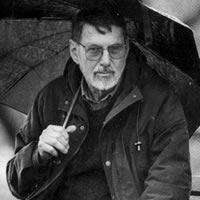
ROBERT CREELY 1928-2005
CREELEY’S
BIRTHDAY DRIVE
By Andrei
Codrescu
Bob Creeley’s
birthday parties were legendary, but nobody in their right
mind would get in a car with Bob for his traditional birthday
drive. Not even anybody in Bolinas, California, in the mid-seventies
when being in your “”right mind” was a matter
of perspective. Which is why everyone laughed when Bob, his
one good eye shining demonically, cast about for someone to
drive with him from Bolinas to Stinson Beach and back, in
honor of his 50-something birthday. Bob made his request about
half way through the night, at a time when at least half the
celebrants were safely beyond his reach, having curled up
to snore on the beach or passed out on the floors that Bobbie
was going to have a hell of a time restoring the next day
or week. Bobbie Louise Hawkins, then Mrs. Creeley, was like
a sturdy redwood in a storm at these events. Steadfast, heroic,
hospitable, right there, but no man’s fool. And not
all like a redwood, physically. More willowy, actually. Time,
in those days, was also quite fluid. When Bob called for a
driving companion, I was somewhat awake and I thought that
it would be a great opportunity and honor for me, a young
poet, to accompany the master on this unique journey. I felt
chosen and utterly thrilled to get private time with the man
who wrote, “I Know a Man,” a poem in which the
line, “Drive, he sd,” famously occurs. Alright
then. I climbed into the passenger seat of something I don’t
quite remember, except that it was old and huge and made a
lot of noise, and with Bob at the wheel we hurled ourselves
into the California night on the twisty black ribbon flung
above the Pacific Ocean with the stars swirling all over it.
Soon after launch, I knew with sudden certainty that Bob’s
one good eye was closed and that he was not using the brake
after flooring the gas pedal. We flew at unimaginable speeds
over loopy ridges and through the stars and I also knew beyond
the shadow of a doubt that this was the death ride that, I
later found out, was Bob’s annual defiance of nature
and fate. I also found out that the few people who had accepted
this ride in the past and survived, had become secretly phobic
about cars and many of them quit driving. I found these things
out much later, but for the moment all I saw was the flashing
brilliance of foam riding the crest of waves hundreds of feet
below us and the piercing coldness of stars throwing themselves
at us as we threw ourselves at them. I tried to think: “cosmic
embrace,” but it wasn’t a comforting hug, no matter
what my strenuously acquired California beliefs dictated.
Except for this regression to elemental fears, nothing came
of my intimacy with the great man. Bob didn’t utter
a word until our space vehicle thudded to a merciful stop
in Stinson Beach. I tumbled out weak-kneed, still holding,
it appears, a flask half-full of whiskey. I handed it to him:
“Well, happy birthday, Bob!” He took a huge swig,
then said, “Ready to go back?” “Well, actually,”
I mumbled apologetically, “I think that I’ll stay
in Stinson tonight… visit a friend.” Creeley grinned.
He knew and didn’t think to blame me. I’d been
willing to risk my life with him for at least half the trip
and that was more than any of his enlightened friends had
been willing to do. I had promise. I may have even been the
poet I thought I was. At least, that’s what I think
he thought. On subsequent occasions, we were better friends,
and it became unnecessary to go to all that trouble to prove
anything. There will be many memoirs written about the poet,
who passed away at the age of 78 on March 30th 2005, and I
will add some of my own in time. But for now, look at my knuckles:
they are white just from remembering.

Gregory
Braquet
lets us see the true Lassie, then confesses that "love
hurts." For such incomparable pairing, we've created
a new corpse Division. (By the way, for those who know us
not: the different Divisions of the Corpse have their offices
in different buildings in different cities in the world, and
are managed by anonymous litterateurs with a record.)
Robert
Sward introduces us to "Shelby the Dog"
in his new poem. Shelby is a philosopher, a bit Zen, and a
teacher Lassie can use. Also appearing here is Laika, the
space dog who (with Elvis) invented the Sixties.
Paul
B. Hertneky, cool as a cucumber, regards his dog from
a non-attachment perspective
Christine
Hamm asks "Who has not wished her husband into
a cat?," and nobody around here raised their hand. OK.
Judith
Roche has mastered the Vulcan technique of Mind-Meld
with lakes, lake creatures, angels, and also Raven and Coyote.
In these poems, she drafts them for Good.
Colette
LaBouff Atkinson delivers the animal heat and flurry
of parrots, pigs, steers, sliced like time for the uses of
words
Rebecca
Lu Kiernen came into this division for "body
temperature tentacles tickling flesh," sufficient reason
it seemed to us to place her in the anti-anthropomorphic camp
(sometimes we are wrong). But then, there are also "claw
marks in the curtains." Who made them and why is a proper
study for anti-anthropomorphic students.
Kenji
Siratori needs no explanation; his work, "Reptilian,"
is just that.
David
Parker Jr. subtly explains how the rich kill the unborn,
in "Art of the Egg."

Urgent!
Gathering Threat! Mel Gibson to the Courtesy Cross!
COPULATING
WITH DEVILS: CACODEMONOMANIA by David
Brizer
In the
February 1987 number of Psychiatry, a journal for the
trade held at least at the time in high esteem by not a few
of my colleagues, there is a paper on the seemingly obscure
yet nonetheless burningly relevant subject of intercourse
with demons. 'Cacodemonomania', both the title of the paper
, written by Salmons and Clarke and the term given to the
practice, reviews the subject and even provides the reader
with several case studies of more than passing interest. click
here to continue...
The Economics
of Giles Goodland:
All we know is that it works
John
Leary on the failure of negotiations due to overly
advanced negotiating techniques
Sheila
Raeschild deploys severe questions at personal consumption
habits
Raheem
M. Cash documents fund-raising techniques of public
broadcasting in "Joie-de-Give."
Anil
Olkin takes apart a soldier in order to identify the
ideological organs
Michael
Ricciardi probes the physics of the New Economics
with home-made Language Tool
Dude
Wallers reports on the inattention of young scientists
unwittingly used as carriers of a radioactive alien species!
A TRUE STORY.
Lenore
Weiss took these "Tech Notes" while observing
a struggle between her computer and her nostalgic poetry.
There is no clear-cut winner and the Corpse isn't taking sides.
Dale
Barrigar, Michael Antonucci, and Garyn Cycholl have
ganged up to produce a tri-cornered battering ram which is
slamming the nation's Kulchur Gate as we speak
Joseph
Rogers on job creation, in "A Place Made for
Doers," a place quite unlike any other
Antonio
Hopson on the economics of a garage, "The Butler
Garage."
A.C.
Boyer on the position of farmers vizavis the Question
of Language; her "Eros, Chaos, Logos" letter could
have ended in the "Poetick Kulchur" section because
she does not present a cogent formula for farming now; as
it is, it's all sod and letters, but the scent of spring earth
is powerfully in here; we call this "mud lettrisme,"
which is an economy.
Kane
X. Faucher has something against "reality television,"
a phenomenon he believes has out-deleuzed Deleuze. We are
not so sure, being virtual producers ourselves

|
|
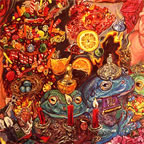
Melissa
Sarat paints the life force in the heart-breaking
world of animal and vegetal forms; her works actually
breathe, they have a pulse!
|
|

Alice
Henderson, new paintings, Cafe Brazil 2004:
Henderson's new work catches New Orleans in its magical
and perennial state of half-sleepy reverie.
|
August
Highland is the creator of monumental-scale
visual poetic works, some as large as 122"x122".
These visual works (called "Exhibition Literature")
are on display at Alphanumeric
Labs. Alphanumeric
Labs has been featured in virtual museums in New
York and Italy. Audio artists around the world are collaborating
with Highland by producing audio tracks to accompany
the online exhibition of the works in a multimedia presentation.
Gallery shows and public performances of these works
are scheduled for 2004 in both the USA and Europe.
|

Willie
Smith is back! In stories and letters! Dracula meets
Jesus this time, and there is a cannibal and wet nurse in
Willie's entourage. We are celebrating the Seattle master's
return by declaring May 1st (the Quintessential Drudges' Day)
Willie Smith Day.
Lee
Ann Mortensen demonstrates how lovers create one another
Joe
Camhi examines the life-long effects of a father's
advice to his son "to bust holes." The resulting
filial mess is half-conscious and that's progress!
Jason
Stella's character's been hurt but good by "a
good Jesuit education," but still has enough strength
to call forth righteous anger. Required reading for waiting
in line to see Mel Gibson's snuff flick.
Kevin
P. Keating: a Jesuit education, continued. "There
are consequences in this life and the next."
Emily
Kruse examines woman self at mid-point; terribly sobering,
and so true.
Gadi
Dechter explicates how "jewish girls" are
made. Not in a day.
Kathryn
Simmonds' cyclopic poetry eyeball records pop culture
as it attempts to construct a safe inner self. Is it possible?
We are not sure Ms. Simmonds knows, attracted equally by Mickey
Rooney and the "smells of peaches."
William
Starr Moake details the destruction of a person by
the Tropics. Dengue fever and memory loss are part of it,
but love for a native could work to ameliorate, if not arrest
the condition.
Clive
Matson's radical erasure of self
Joanna
Hooste on smoke and forgetting
Brent
Nathaniel Bechtel unrolls himself first like an atlas
map, then a dymaxyon map.
Geoffrey
Cruickshank-Hagenbuckle has a number of assistants,
Richard Fiction and Grackle among them, who are charged with
probing certain unspeakable (and personal) urban micro-cultures.
Utahna
Faith bathes in the violet beauty of a pop icon ("Martini
Girl"), then lends her a wrenching cri-de-coeur ("To
The Other"), only to re-enter the world contemplative
and crepuscular ("After Happening Upon a Saved Postcard…)
Kelly
Jean White makes a visceral sculpture of the family
world, using oozy stuff like toothpaste, paint, and feces.
She is an MD, she knows exactly the hygiene required, but
there are unsterilizable portions of the psyche that fly like
questions.
Sean
Kilpatrick portrays the Domina Complainorum unraveling
Cristina
Hanganu Bresch rolls out the scroll of "the men
who ever were," in a lyrical list worthy of Villon
Beatriz
Hausner's "The Ideal Man Poems" examine
the creature at the seams, as it were, even those lost by
Bresch
Roberto
Tocalino's protagonist's erection has become a problem
as he leads tours through Italy. Using his erection as a pointer
to the blackboard of his own psychology, he illuminates the
source of his priapism. Surprise! Read the story and find
out what this stubborn erection discovers!
Stephen
Brynes examines the archetype of "the wandering
Jew," as it comes to life inside a young man of the post-Nixon
era. The Jew as human prototype or posthuman is essential
to the story of "the making and unmaking of persons,"
and such, "it" or "its story" must wander.
Anyway, Byrnes' guy has a voice, I kid you not.
Kris
Broughton shines a cruel searchlight over the frayable
web of political correctness in Atlanta. It's a satire, but
trapped in it like stunned fish are our tippy toes.
Stacey
Abbott is "thinking about folks and how we're
really the same," but in the process discovers some oedipal-sized
lumps that make her generous conclusion more of a "hot
coal" than she cares to admit
Amber
Decker goes to the person before she is even born
and addresses some well-seasoned wary advice in the general
direction of the innocent. Then she complains about a guy
who abandoned her in New York in February. We understand,
really we do.
Pete
Sniegowski's character, Dirk the Lech, may very well
be the guy who abandoned Amber Decker's heroine in New York,
in February. He's an unspeakable worm whose lack of finesse
leads to an all-too-ordinary meanness, alas.
Aimee
LaBrie's guy, on the other hand, has all the qualities
that might have made Dirk the Lech into an interesting human
being. (He wouldn't have been "Dirk the Lech' then, but
Aimee's ultrasensitive person, "Anthony LaFleur,"
let's say.) Aimee, or her lyric spokeswoman, does wish that
Anthony had some Dirk in him, because as things stand nothing
else will.
Cedar
Pruitt addresses herself to that eminent witness and
collaborator in the making and unmaking of persons, The Therapist.
This is one of the many things she has to say to her therapist:
"Maureen, your thoughts are as pure as snow." Sure.
And the Pope is not Polish.
Mark
Spitzer is the pseudonym of a writerly fury unleashed
on earth by the Great God Perspiration. In this fragment from
an abandoned novel, persons of literary origin act in the
real world without any excuses. None of them are either Dirks
or Anthonys, but they compensate by singing, shrieking, and
annoying readers who REALLY like birds.
Chuck
Terzella arrives on the scene just in time to infuse
the scene with regret at the passing of sadistic nuns who
once instilled discipline in children like no one else. Nuns,
it seems, have gone soft. So has everything about persons,
except the making and unmaking of them.
Jeremy Martin
warns us of the dangers of time travel when put to any use
other than the preventive assassination of baby Hitler. He
then generously informs us that the future will end tomorrow.
And he doesn't mean a measly revolution but the great full
stop! So there's no need to stock up on candles. |

Robert
Casella
knows his Greeks; they guide him; he gets up to Christos,
then stops, wisely.
Dennis
DiClaudio revisits the case of Hypatia
Kevin
McLellan transcribes certain oracles, from
Sicily to Jamaica Plain, concerning homosexuality
Frank
Eannarino revisits Genesis for a poetic treatise on
"the evolution of panspermia." We are not sure what
he's after, but the sounds pleased us
Julie
Keitges dips her lyric pail into the Renaissance and
comes up with a noble English serial killer; not the classics,
exactly, but we are selling this one to the History Channel
David
Schwartz asks "Where Does Midrash Derive?"
and then proceeds to answer like a rabbi on acid
Peter
Rabbit wrote this Christmas poem to justify his hanging-by-a-thin-thread
Catholic faith; once more, the reader (and Peter) can thank
the Mother of God for not losing the flock. Oh, and the Holy
Ghost, too.
Maureen
Thorson saltimbanques in these "Deux Poemes di
Cirque," by first merrygorounding autour Max Ernst, then
presenting Calamity Jane (on pense) on her whistlestop campaign
tour. Surrealist classics, quoi?
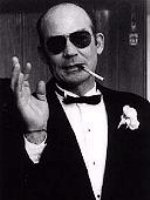
Hunter
S. Thompson 1937-2005
HUNTER S. THOMPSON JOINS GINSBERG, BURROUGHS, AND LEARY
Hunter
took his own life on the 20th of February 2005. We remember
fondly a night in the late 90s when we hung out with him at
Lucky's on St. Charles Avenue in New Orleans. Hunter wore
an impeccable suit and drank whiskey all night, explicating
complex mystery in a gravelly unitone of which we understood
little but loved it all. Present also were Amy Carter and
Doug Brinkley. As the night wore on, we flirted with Amy and
played pool with Doug. Now and then we snuck back looks at
a ramrod straight Hunter holding on to his whiskey glass,
looking both wise and wisttful. We thought it best not to
disturb his equilibrium with any sudden moves. Exquisite
Corpse published on the front page a superb rant at the
media written by Hunter in the 1950s as a letter to the editor
of Time Magazine. The tone of acid amusement and bracing
veracity was already pure vintage Dr. Gonzo. This text was
part of the letter collection Doug Brinkley edited and later
published. There are a million Hunter. S. Thompson stories
being told as we scribble this, and they'll doubtlessly swell
his lore and the legend. Here, at the Corpse, we applaud
his life and his courage in ending it. Like those of his contemporaries
we mentioned in the headline, Hunter will go on making life
bigger and livelier. He played, inspired, suffered, and showed
us how writing is done.
-
The Corpse

Scandal!
Dr. Jamey Hecht takes our beloved contributor Danuta
Borchardt to task for her breaching of the fiction-nonfiction
border in her notorious Corpse piece on Harvard molecular
biologist Donald C. Wiley; Danuta Borchardt responds; the
Editor responds. A farrago brews!
Sean
Foxfire aims a furious lament at the Corpse for the
absence of the now-mythic Body Bag. The Editor responds.
Zachary
George moves to New Orleans and lodges complaint with
Corpse

SPECIAL
TO THE CORPSE! THE PLAN:
HOW FIVE YOUNG CONSERVATIVES RESCUED AMERICA, edited by
Nick Bromell
Among
Washington insiders, rumors have circulated for years about
a secret conservative plan to crush liberal opposition and
assume full control of American politics. In the late 1960s,
according to legend, a handful of young conservatives calling
themselves "The Famous Five" came up with the key
ideas and the overall strategy of such a plan, won support
for it from powerful corporate interests, and set in motion
the train of events that has led to the election of Ronald
Reagan, the advent of a Republican majority in the House of
Representatives, and the triumphs of George W. Bush.
Until
now, "The Plan" has been merely a rumor. In the
late 1980s, young conservatives spent hours reverently
speculating about it over drinks at "The Sign of the
Indian King" on M Street, while across town frustrated
young liberals in the think tanks around Dupont Circle darkly
attributed every conservative victory to this mythic document.
By
the mid-1990s, the myth started to fade as each succeeding
triumph of the conservative movement made it increasingly
improbable that any group, however brilliant, could have planed
the whole campaign. Eventually people referred to "The
Plan" as one might refer to the Ark or to the gunman
on the grassy knoll: intriguing but fantastical.
Indeed,
the very idea of such a plan probably would have evaporated
from political consciousness had not the Board of Directors
of the National Enterprise Initiative commissioned a distinguished
American historian to write an informal history of that organization
for the 35th anniversary of its founding. Two years later,
and for reasons we may never fully understand, the historian
and the Board fell into bitter dispute. The Board paid the
historian the advance stipulated in their contractual agreement
and severed all relations with him.
Subsequently,
and by means I may not divulge, a draft of the historian's
book, titled "The Plan": How Five Young Patriots
Engineered the Rescue of America, found its way into my
hands, along with interview transcripts, official correspondence,
and related documentary materials. The excerpts from
his materials that follow put before the public for the first
time undisputable proof of the existence of "The Plan"
and tell the remarkable story of the conservative capture
of American culture and politics. (For reasons which
will become sufficiently obvious, if they are not already,
the names of all personages in this account, including the
name of the historian, have been changed.)
A more
complete version of "The Plan," with my more
extensive notes and annotations, will be published next year.
- Editor
THE
PASSION OF THE MASOCHRIST!By Max Cafard
Special to the Corpse!
Coming Attraction: The Passion of the Buddha?
It's rumored
that Mel Gibson has been hired to do for Buddhism what he's
done for Christianity. His next film will be The Passion
of the Buddha. Do you know the story? The Buddha's end
also came through a sacrifice. A lavish banquet was prepared
for him but one of the dishes was contaminated. Knowing this,
and having consideration for his host and companions, the
Buddha chose to eat the poisonous food and leave the wholesome
dishes for the rest of the assembly. What followed is rather
harrowing—but imagine the vast cinematic possibilities.
Twelve hours of vomiting, diarrhea, excruciating pain, and
intestinal bleeding. Though the scriptures remain discretely
reticent on this subject, there was no doubt abundant and
painful gas. In short, the stuff that Mel Gibson movies are
made of.
Somehow
I doubt whether many Buddhists would find this drama very
compelling. However, there may be among them a few naive souls
with a pathologically morbid fear of being reincarnated as
a slug who might think it could do them some good. If the
film materializes, we will certainly investigate this question
carefully. Meanwhile, we will be content to take a look at
Gibson's first stab at a passion story. click
here to continue
Jim
Harrison rages epic and lyric across the telly-ravaged
American mind, remembering things once real now poofed away
by "fascist Disneyland." A great writer and a stubbornly
real man, Harrison can't bear to see the meltdown of everything
into hyperreal pudding. It's not nostalgia, it's a violent
recall of the ancient gods.
Dawn
Baude asks, in perfect contretemps to Harrison, "Why
would I waste my beautiful mind on that?" ironically
quoting Barbara Bush on something, maybe the recent war. The
source of both poets' anger is in this recent war, but the
ripples go far and wide, deep and high.
Shauna
Rogan in "For Bernardine Dohrn and Future Meteorologists"
seems to collage the voices of angry revolutionary women (or
is it just one voice?) to make the case for a new language
of protest
Lawrence
Millman reviews Saddam Hussein's fiction in "Deconstructing
Saddam"
Gary
Sloan calls reasonably for rabid theocrats to quit
quoting old American presidents for their agenda of overthrowing
the secular state
Willis
Barnstone goes to another universal for his straw
of pure insight, namely "Time," something that we,
here at the Corpse, have abolished. Still, what can we do
about it? As the great translator of "The New Covenant"
and the "Gnostic Gospels" says, "I can always
spot the damage he has done." Not to your poetry, cher
maitre.
Ramon
Arjona is a mystic and a visionary, but no less demotic
for the flight-hours he puts in.
Dale
Depweg makes "a modest proposal for offsetting
the federal deficit" and it's not about eating people
(alas!), it's actually sensible! It should be tried! It will
work!
Michael
Rerick has culled a number of "alien abduction"
reports specially for the Corpse, to aid us in our work of
identifying which of our current leaders are aliens; so far,
we have discovered that all those bearing one-syllable names
denoting a place or thing–- Bush, Grove, Rice, Gates,
etc – are indeed aliens whose names were chosen for
mnemonic ease.
Paul
Krassner revisits the perennial argument between marijuana
and cigarettes. He quotes Dr. West, from the Betty Ford Center:
"Alcoholics eventually die from lung cancer more often
than from alcohol-related causes."
Terry
Stokes has allotted his Christian neighbors and the
unforgettable Annie Goldberg to his poetry-hours
Rebecca
Weaver, plainly astonished at the consciousness of
non-city people, discusses (respectfully) the possible co-ordinates
of their home planets
Ariel
Beller sings the ballad of Forrest Moon, a man with
a direct line to God.
Curtis
Rama speaks words in flames on several locations on
9/12, including NYC, locus of the national wound

William
Pitt Root takes no prisoners while he trashes the
rich with a kind of manly anger we haven't seen in this magazine
since Mark Spitzer went to Kansas
Jim
Hazard's prose fumes like a steel-mill smokestack
in this midwestern epic of night shift realism
Michael
K. White's extremely scary report from the angry gut
of the proletariat
Al
Frank writes from heart-breaking universe of the struggling
(artsy and love-starved) young
John
L. Sheppard's "Gimpy" gets fired and has
an instant vision of a better life
April
MacIntyre is a corporate crisis PR specialist, and
her story of panic at SilverLake, "an artsy, eastern
Los Angeles community," is no fairy-tale.
Dan
Campbell serves the working class by revealing just
how much plastic there actually is in the mind of the CEO;
also, he respects what $10 represents (not like some of our
readers)
Chris
Semansky generates the perfect Recommendation Letter,
then pens a "Self-Portrait Pending Approval," proving
that he's fully hipped to the hell machine
Doren
Robbins sings (in two stories) the tragic predicament
of an employed (maybe) salad-eater who explores sexuality
(maybe) and white-collar crime (certainly) for purely emotional
reasons.
Benjamin
Ikenson's father coming home from work
Stashu
Kapinski is "an amalgam of voices from the Lawrenceville
neighborhood in Pittsburgh… unemployed steel workers,
chronic drunks, disenfranchised immigrants…"
Jonathan
Lyons scores one for "The Graveyarders."
We do know how weird the world looks when you're pulling that
graveyard shift; it's how the Corpse is born, every time.
Damien
Thompson makes an argument against "Hangovers"
(no argument here), from the point of view of a poor drudge
who must work the next day. ‘Nuf said.
|



